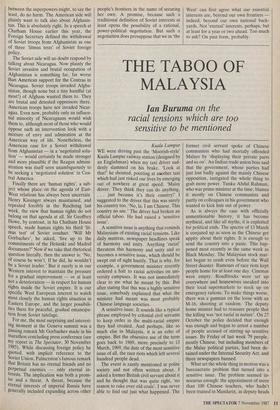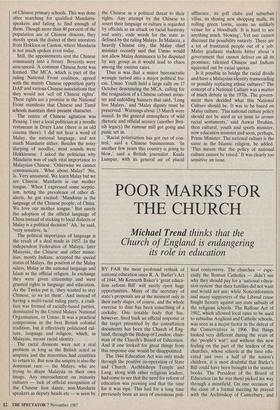THE TABOO OF MALAYSIA
Ian Buruma on the
racial tensions which are too sensitive to be mentioned
Kuala Lumpur WE were driving past the 'Moorish-style' Kuala Lumpur railway station (designed by an Englishman) when my taxi driver sud- denly slammed on his brake. 'Look at that!' he shouted, pointing at another taxi which had just risked our lives by emerging out of nowhere at great speed. 'Malay driver. They think they can do anything, . . . just because it's their country!' I suggested to the driver that this was surely his country too. 'No, la. I am Chinese. This country no use.' The driver had broken an official taboo. He had raised a 'sensitive issue'.
A sensitive issue is anything that reminds Malaysians of existing racial tensions. Like daily mantras, newspaper headlines speak of harmony and unity. Anything 'racial' threatens this harmony and unity and so becomes a sensitive issue, which should be swept out of sight hastily. That is why, for example, a government minister recently ordered a halt to racial activities on uni- versity campuses. It was not immediately clear to me what he meant by this. But after stating that this was a highly sensitive issue, somebody explained that what the minister had meant was most probably Chinese language societies.
A sensitive issue. It sounds like a typical 'phrase employed by colonial civil servants to keep order in the multi-racial empire they had created. And perhaps, like so much else in Malaysia, it is an echo of empire. But the obsessive use of the term goes back to 1969, more precisely to 13 March, 1969, the date of the most sensitive issue of all, the race riots which left several hundred people dead.
The event is rarely mentioned in polite society and not often written about. I asked a former British civil servant about it and he thought that was quite right, 'no reason to rake over old coals'. I was never able to find out just what happened. The former civil servant spoke of Chinese communists who had mortally offended Malays by 'displaying their private parts and so on'. An Indian trade union boss said that the government, whose parties had just lost badly against the mainly Chinese opposition, instigated the whole thing to grab more power. Tunku Abdul Rahman, who was prime minister at the time, blames it mostly on Chinese communists and partly on colleagues in his government who wanted to kick him out of power.
As is always the case with officially unmentionable history, it has become mythical, and like all myths, it is exploited for political ends. The spectre of 13 March is conjured up as soon as the Chinese get uppity about their rights. It is enough to send the country into a panic. This hap- pened most recently in the same week as Black Monday. The Malaysian stock mar- ket began to crash even before the Wall Street disaster. Rumours of race riots kept people home for at least one day. Cinemas were empty. Roadblocks were set up everywhere and housewives sneaked into their local supermarkets to stock up on emergency rations. To make things worse, there was a gunman on the loose with an M-16, shooting at random. The deputy home minster had to reassure people that the killing was 'not racial in nature'. On 27 October the police decided that enough was enough and began to arrest a number of people accused of stirring up sensitive issues. By Friday of last week 79 people, mostly Chinese, but including members of the Malay political parties, had been de- tained under the Internal Security Act, and three newspapers banned.
What set the whole thing in motion was a bureaucratic problem that turned into a sensitive issue. The problem seemed in- nocuous enough: the appointment of more than 100 Chinese teachers, who hadn't been trained in Mandarin, as deputy heads of Chinese primary schools. This was done after searching for qualified Mandarin- speakers and failing to find enough of them. Though more than 40 per cent of the population are of Chinese descent, they mostly speak the dialect of their ancestors from Hokkien or Canton, where Mandarin is not much spoken even today.
Still, the appointments sent the Chinese community into a frenzy. Boycotts were announced. A common Chinese front was formed. The MCA, which is part of the ruling National Front coalition, agreed with the mainly Chinese opposition party DAP and various Chinese associations that they would not 'sell off Chinese rights'.
These rights are a promise in the National Front manifesto that Chinese and Tamil schools maintain their present character.
The centre of Chinese agitation was Penang. I met a local politician at a noodle restaurant in Drury Lane (there is an old cinema there). I did not hear a word of Malay, the national language, and not much Mandarin either. Besides the noisy slurping of noodles, most sounds were Hokkienese. I asked the politician why Mandarin was of such vital importance to Malaysian Chinese. 'Otherwise we cannot communicate.' What about Malay? 'No, la. Very unnatural. We learn Malay but we are Chinese. Mandarin is our mother tongue.' When I expressed some sceptic- ism, noting the prevalence of other di- alects, he got excited: 'Mandarin is the language of the Chinese people, of China. We love our mother tongue.' But surely the adoption of the official language of China instead of sticking to local dialects or Malay is a political decision? `Ah,' he said, `very sensitive, Ia.'
The political importance of language is the result of a deal made in 1957. In the independent Federation of Malaya, later Malaysia, the Chinese and other minor- ities, mostly Indians, accepted the special status of Malays, the position of the Malay rulers, Malay as the national language and Islam as the official religion. In exchange they were given citizenship and were granted rights in language and education. As the Tunku put it, `they wanted to stay Chinese, so we let them'. And instead of having a multi-racial ruling party, a coali- tion was formed of racially-based parties, dominated by the United Malays' National Organisation, or Umno. It was a practical compromise in the best British colonial tradition, but it effectively politicised cul- ture, language and religion, which, in Malaysia, means racial identity.
The racial divisions were not a real problem as long as the British acted as umpires and the minorities had countries to return to. But now the umpire is also the dominant race — the Malays, who are trying to shape Malaysia in their own image. Any encroachment on minority cultures — lack of official recognition of the Chinese lion dance, non-Mandarin speakers as deputy heads etc — is seen by the Chinese as a political threat to their rights. Any attempt by the Chinese to assert their language or culture is regarded by officials as an attack on racial harmony and unity, code words for the state as defined by the ruling Malays. In Malacca, a heavily Chinese city, the Malay chief minister recently said that Umno would not allow Malay dominance to be disputed by any group as it would lead to chaos among the various races.
Thus is was that a minor bureaucratic wrangle turned into a major political fra- cas. Umno Youth held a large rally on 17 October denouncing the MCA, calling fdr the resignation of a Chinese cabinet minis- ter and unfolding banners that said, 'Long live Malays,' and 'Malay dignity must be preserved.' Warnings about 13 March were issued. In the general atmosphere of wild rhetoric and official secrecy (another Brit- ish legacy) the rumour mill got going and panic set in.
`Racial polarisation has got out of con- trol,' said a Chinese businessman. 'In another few years this country is going to blow,' said a British journalist. Kuala Lumpur, with its general air of placid affluence, its golf clubs and suburban villas, its shining new shopping malls, its rolling green lawns, seems an unlikely venue for a bloodbath. It is hard to see anything much 'blowing'. Yet one cannot discount the possibility entirely. There are a lot of frustrated people out of a job: Malay graduate students bitter about a government that cannot deliver on all its promises; talented Chinese and Indians squeezed out by racial quotas.
Is it possible to bridge the racial divide and have a Malaysian identity transcending or possibly replacing ethnic cultures? The concept of a National Culture was a matter of much debate in the 1970s. The govern- ment then decided what this National Culture should be. It was to be based on Malay culture. 'This national culture policy should not be used as an issue to arouse racial sentiments,' said Anwar Ibrahim, then cultural, youth and sports minister, now education minister and soon, perhaps, Prime Minister. The national culture is the same as the Islamic religion, he added. `This means that the policy of national culture cannot be raised.' It was clearly too sensitive an issue.



































































 Previous page
Previous page